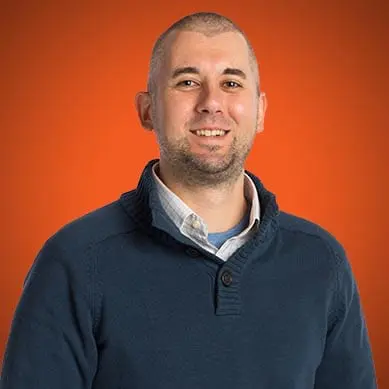Paul Shafer holds a PhD in health policy and management from the University of North Carolina Chapel Hill. He is part of the Health Policy Research Scholars Cohort 2016.
Before we begin, tell us a little bit about yourself and what your research interests are.
I am a first-generation American, the only child of immigrants who defected from then Soviet-controlled Hungary to New York City in the 1970s. We moved to North Carolina when I was in 7th grade, and its academic institutions have really shaped my life. I was lucky enough to attend the first residential STEM high school in the country, the North Carolina School of Science and Mathematics, before moving on to the University of North Carolina system for each of my three degrees. I received a BA in Economics from UNC and an MA in Applied Economics from UNC Greensboro before coming back to UNC Chapel Hill for a PhD in Health Policy and Management. My dissertation focuses on the Affordable Care Act (ACA) and how it has affected the use of emergency departments and primary care, trying to better understand how gaining insurance coverage changes how people use care. This is one piece of a larger interest in how we finance health care through a complicated system of public and private provision with many still uninsured.
What’s the story behind why you’re doing what you’re doing?
My education and career trajectory have taken a somewhat indirect path, but it has all driven how I ended up interested in this area of research. After undergrad, I worked as a financial planner and became licensed to sell life, health, long-term care, and disability insurance. I learned a lot about how insurance products were designed and where the gaps were for people trying to get health insurance pre-ACA, when you could still be declined for pre-existing conditions or priced out of coverage even if you were not actually declined. This prompted me to go back to school to try to understand health insurance policy better—why things are the way they are, who is left out, what effect that has on health, finances, etc., and how we can make things better.
Tell us about a project you are currently working on that you are excited about?
I am working to better understand how advertising contributes to people enrolling in health insurance coverage through the ACA. Over the past few years, federally funded television advertising for HealthCare.gov has been halted, and funding for in-person enrollment assistance, an important resource for disadvantaged communities, has been repeatedly cut. We are using county-level enrollment data along with proprietary advertising data to see how federal, state, the insurance company, and other advertising each contribute to enrollment—independent of changes in plan availability and pricing over time.
For people unfamiliar with your research area, what is one piece of information you think is important for them to know?
Health insurance is really important but is only one piece, not the whole answer. People need to feel empowered to get the care that they need. We also cannot ignore that disparities in health reflect inequities upstream that will take substantial investment and a long time to correct, and that is only if we can find the political will to do so.
Who is a researcher you admire and why?
I have never met him, but I really admire Scott Cunningham, a health economist at Baylor University. His research focuses on sex work and provides really fascinating implications for policy in an area that is very controversial and often subject to moralizing and policymaking that does more harm than good. However, even more so, I admire him for his honesty and vulnerability about issues in his own life, the economics profession, and academia in general. He is so supportive of others on Twitter, particularly graduate students, which can help bring attention to up-and-coming scholars in a very crowded and hierarchical field. He is just a very genuine-seeming person whom I hope I can learn from and try to emulate as I transition into faculty life.
How has being an HPRS Scholar helped you during your time as a doctoral candidate?
HPRS has created a community of amazingly diverse scholars who approach fundamental questions about our society and health equity from a lot of different experiential and disciplinary perspectives. We learn from and lean on each other, using our collective knowledge and networks to help everyone be more successful. The funding has provided me with the flexibility to pick and choose the research and teaching opportunities that provide the most valuable preparation for the job market. It also allowed me to pursue a more ambitious dissertation; I spent a significant amount of my funding on data that I otherwise would not have been able to get.
In the RWJF HPRS program, we have worked with you to help you think further about using your research to develop policy. If you could use your research to change any policy, what policy would it be?
That is a tough question. There are too many good answers because unfortunately there are so many policies that exacerbate inequity rather than try to eliminate it. Any policy that makes the social safety network better by removing redundancies and barriers would be a great option. A unified application for Medicaid; Supplemental Nutrition Assistance Program (SNAP); Special Supplemental Nutrition Program for Women, Infants, and Children (WIC); and Temporary Assistance for Needy Families (TANF) would be a great start to begin to reduce the burdens on those seeking assistance.
Ok, here’s a fun question to wrap things up. If you were stranded on a desert island, what three items would you want to have with you?
An unlimited supply of coffee, enough books to lose myself in for years, and a good companion.
Thank you so much for your time!

